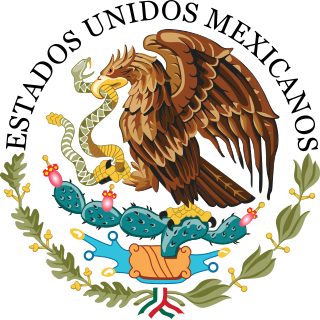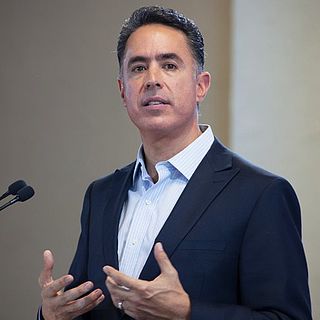
The politics of Mexico function within the framework of a federal presidential representative democratic republic whose government is based on a multi-party congressional system, where the President of Mexico is both head of state and head of government. The federal government represents the United Mexican States. It is divided into three branches: executive, legislative, and judicial, established by the Political Constitution of the United Mexican States, published in 1917. The constituent states of the federation must also have a republican government based on a congressional system established by their respective constitutions.
The National Organization of the Anvil or simply El Yunque is the name of an alleged conservative Mexican secret society whose existence was first claimed by journalist Alvaro Delgado in 2003.

Citizens' Movement is a center-left political party in Mexico. It was founded in 1999 under the name Convergence for Democracy, which was then shortened to Convergence in 2002 and changed to Citizens' Movement in 2011.

Felipe de Jesús Calderón Hinojosa is a Mexican politician who served as the 63rd president of Mexico from 2006 to 2012 and Secretary of Energy during the presidency of Vicente Fox between 2003 and 2004. He was a member of the National Action Party for 30 years before quitting the party in November 2018.

General elections were held in Mexico on Sunday, 2 July 2006. Voters went to the polls to elect a new President of the Republic to serve a six-year term, replacing then President Vicente Fox ; 500 members of the Chamber of Deputies to serve for three-year terms; and 128 members of the Senate to serve for six-year terms.

The New Alliance Party is a state-level political party in Mexico founded in 2005.
This is a list of events that happened in 2008 in Mexico.
This is a list of events that happened in 2009 in Mexico. The article also lists the most important political leaders during the year at both federal and state levels.
This is a list of events that happened in 2011 in Mexico. The article also lists the most important political leaders during the year at both federal and state levels.

Marisela Escobedo Ortiz was a Mexican social activist from Juarez, Chihuahua, who was assassinated while protesting the 2008 murder of her daughter.

Javier Corral Jurado is a Mexican politician formerly affiliated with the National Action Party (PAN), who served as Governor of Chihuahua from 2016 to 2021. He has served in politics since the early 1980s, including six terms between the Chamber of Deputies and Senate. Corral also specializes in communications and has a long career as a columnist and founder of various publications; he also was instrumental in the successful constitutional challenge that struck down the Televisa Law.

José Rosas Aispuro Torres is a Mexican lawyer and politician affiliated with the National Action Party (PAN) who served as the governor of Durango from 2016 to 2022. From 2012 to 2015, he served as senator in the 62nd and 63rd Congresses representing Durango. He also was Municipal President of Durango, Durango, from 2001 to 2004.

General elections were held in Mexico on 1 July 2018. Voters elected a new President of Mexico to serve a six-year term, 128 members of the Senate for a period of six years and 500 members of the Chamber of Deputies for a period of three years. It was one of the largest election days in Mexican history, with most of the nation's states holding state and local elections on the same day, including nine governorships, with over 3,400 positions subject to elections at all levels of government. It was the most violent campaign Mexico has experienced in recent history, with 130 political figures killed since September 2017.

José Guillermo Anaya Llamas is a Mexican politician affiliated with the PAN. As of 2013 he served as Deputy of both the LIX and LXII Legislatures of the Mexican Congress representing Coahuila. He also served as Senator during the LX and LXI Legislatures.

Gustavo Adolfo Cárdenas Gutiérrez is a Mexican businessman and politician affiliated with Movimiento Ciudadano. He represents Tamaulipas and the second electoral region in the Chamber of Deputies for the LXIII Legislature of the Mexican Congress and has previously been a federal deputy and senator from the same state.

Cruz Pérez Cuéllar is a Mexican politician affiliated with the National Regeneration Movement (Morena). In 2018 he was elected to the Senate from Chihuahua for the 64th and 65th sessions of Congress (2018–2024). After taking leave from his Senate seat, he was elected Mayor of Ciudad Juárez on 6 June 2021.
Miguel Ángel González Salum is a Mexican politician from the Institutional Revolutionary Party. He currently serves as a federal deputy in the LXIII Legislature of the Mexican Congress representing the Fifth Federal Electoral District of Tamaulipas, centered on Ciudad Victoria.
Héctor Armando Cabada Alvídrez is a Mexican television journalist, television anchor and politician who has served as the Municipal President of Ciudad Juárez from 2016 until 2021. Cabada, a political independent, was elected to the position in June 2016. He previously had anchored newscasts on XHIJ Canal 44, a television station based in Ciudad Juárez.

Por México al Frente, also known as Frente Ciudadano por México, Frente Amplio Democrático, or Frente Amplio Opositor, was a big tent electoral alliance consisting of the centre-right National Action Party (PAN), as well as the centre-left Party of the Democratic Revolution (PRD) and Citizens' Movement (MC) to compete in the 2018 Mexican Federal Election.

Legislative elections were held in Mexico on 6 June 2021. Voters elected 500 deputies to sit in the Chamber of Deputies for the 65th Congress. These elections took place concurrently with the country's state elections.














